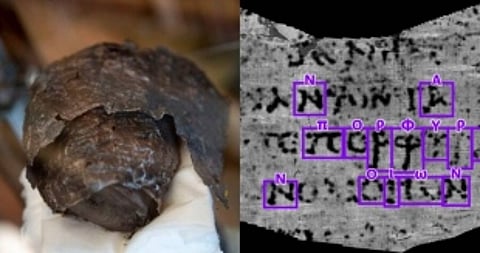

Three researchers have been awarded a $700,000 prize for leveraging artificial intelligence to decipher a 2,000-year-old scroll that endured the scorching eruption of Mount Vesuvius. The Herculaneum papyri, a collection of approximately 800 Greek scrolls, were carbonized during the volcanic eruption in 79 CE that engulfed the ancient Roman town of Pompeii, as revealed by the organizers of the "Vesuvius Challenge."
Resembling hardened logs of ash, the scrolls, housed at the Institut de France in Paris and the National Library of Naples, suffered extensive damage and deterioration, often crumbling when attempts were made to unfurl them. To address this challenge, the Vesuvius Challenge conducted high-resolution CT scans of four scrolls and offered a total prize of one million dollars to incentivize research endeavours.
The trio of winners includes Youssef Nader, a PhD student based in Berlin, Luke Farritor, a student and SpaceX intern hailing from Nebraska, and Julian Schilliger, a robotics student from Switzerland. Their innovative approach utilized AI to discern ink from papyrus and decipher the faint, nearly illegible Greek script through advanced pattern recognition techniques.
Collectively, their efforts have successfully decrypted approximately five per cent of the scroll, shedding light on its author, likely the Epicurean philosopher Philodemus. The content of the scroll reportedly delves into topics such as music, culinary arts, and the pursuit of life's pleasures.
The scrolls were discovered in a villa believed to have once belonged to Julius Caesar's patrician father-in-law, whose extensive, largely unexplored estate may conceal thousands more manuscripts. The recovery of previously unseen ancient texts represents a significant breakthrough, given that only an estimated 3 to 5 per cent of ancient Greek texts have survived, as indicated by data from the University of California, Irvine.